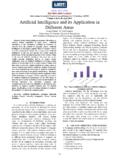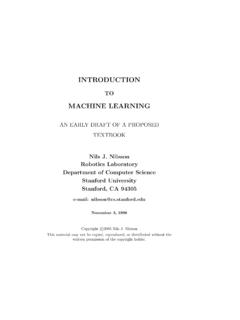Transcription of Artificial intelligence (AI) in healthcare and research
1 OVERVIEW AI is being used or trialled for a range of healthcare and research purposes, including detection of disease, management of chronic conditions, delivery of health services, and drug discovery. AI has the potential to help address important health challenges, but might be limited by the quality of available health data, and by the inability of AI to display some human characteristics. The use of AI raises ethical issues, including: the potential for AI to make erroneous decisions; the question of who is responsible when AI is used to support decision-making; difficulties in validating the outputs of AI systems; inherent biases in the data used to train AI systems; ensuring the protection of potentially sensitive data; securing public trust in the development and use of AI technologies; effects on people s sense of dignity and social isolation in care situations; effects on the roles and skill-requirements of healthcare professionals.
2 And the potential for AI to be used for malicious purposes. A key challenge will be ensuring that AI is developed and used in a way that is transparent and compatible with the public interest, whilst stimulating and driving innovation in the IS AI?There is no universally agreed definition of AI. The term broadly refers to computing technologies that resemble processes associated with human intelligence , such as reasoning, learning and adaptation, sensory understanding, and Currently, most applications of AI are narrow, in that they are only able to carry out specific tasks or solve pre-defined intelligence (AI) in healthcare and researchRECENT INTEREST in ai ai is not new, but there have been rapid advances in the field in recent years.
3 This has in part been enabled by developments in computing power and the huge volumes of digital data that are now A wide range of applications of AI are now being explored with considerable public and private investment and interest. The UK Government announced its ambition to make the UK a world leader in AI and data technologies in its 2017 Industrial Strategy. In April 2018, a 1bn AI sector deal between UK Government and industry was announced, including 300 million towards AI is lauded as having the potential to help address important health challenges, such as meeting the care needs of an ageing population.
4 Major technology companies - including Google, Microsoft, and IBM - are investing in the development of AI for healthcare and research . The number of AI start-up companies has also been steadily There are several UK-based companies, some of which have been set up in collaboration with UK universities and hospitals. Partnerships have been formed between NHS providers and AI developers such as IBM, DeepMind, Babylon Health, and Ultromics. Such partnerships have attracted controversy, and wider concerns about AI have been the focus of several inquiries and initiatives within industry, and medical and policy communities (see Box 1).
5 AI works in a range of ways, drawing on principles and tools, including from maths, logic , and biology. An important feature of contemporary AI technologies is that they are increasingly able to make sense of varied and unstructured kinds of data, such as natural language text and images. Machine-learning has been the most successful type of AI in recent years, and is the underlying approach of many of the applications currently in Rather than following pre-programmed instructions, machine-learning allows systems to discover patterns and derive its own rules when it is presented with data and new 1.
6 EXAMPLES OF INQUIRIES AND INITIATIVES ON AI UK Government Centre for Data Ethics and Innovation announced in January 2018 to advise on safe, ethical, and innovative uses of data-driven Ada Lovelace Institute the Nuffield Foundation announced it will set up the Institute by the end of 2018 to examine ethical and social issues arising from the use of data, algorithms, and AI, ensuring they are harnessed for social Partnership on AI a platform for discussion and engagement around AI founded by Amazon, Apple, DeepMind, Facebook, Google, IBM, and IEEE launched a Global Initiative on Ethics of Autonomous and Intelligent Systems in United Nations Interregional Crime and Justice research Institute set up a programme on Artificial intelligence and Robotics in Asilomar AI Principles developed in 2017 by the Future of Life Institute (US)
7 To guide AI research and application, and signed by over 3,800 researchers and others working in AI and robotics around the Reports on AI have been published by the House of Lords Select Committee on Artificial intelligence ,5 the Royal Society,3 Reform,14 Future Advocacy and Wellcome,15 Nesta,16 and the European Group on Ethics in Science and New A further report is expected from the House of Commons Science and Technology Select Council on Bioethics 2 APPLICATIONS OF AI IN healthcare AND RESEARCHHEALTHCARE ORGANISATIONAI has the potential to be used in planning and resource allocation in health and social care services.
8 For example, the IBM Watson Care Manager system is being piloted by Harrow Council with the aim of improving cost efficiency. It matches individuals with a care provider that meets their needs, within their allocated care budget. It also designs individual care plans, and claims to offer insights for more effective use of care management is also being used with the aim of improving patient experience. Alder Hey Children s Hospital in Liverpool is working with IBM Watson to create a cognitive hospital , which will include an app to facilitate interactions with patients. The app aims to identify patient anxieties before a visit, provide information on demand, and equip clinicians with information to help them to deliver appropriate RESEARCHAI can be used to analyse and identify patterns in large and complex datasets faster and more precisely than has previously been It can also be used to search the scientific literature for relevant studies, and to combine different kinds of data.
9 For example, to aid drug The Institute of Cancer research s canSAR database combines genetic and clinical data from patients with information from scientific research , and uses AI to make predictions about new targets for cancer Researchers have developed an AI robot scientist called Eve which is designed to make the process of drug discovery faster and more AI systems used in healthcare could also be valuable for medical research by helping to match suitable patients to clinical CAREAI has the potential to aid the diagnosis of disease and is currently being trialled for this purpose in some UK hospitals.
10 Using AI to analyse clinical data, research publications, and professional guidelines could also help to inform decisions about Possible uses of AI in clinical care include: Medical imaging medical scans have been systematically collected and stored for some time and are readily available to train AI AI could reduce the cost and time involved in analysing scans, potentially allowing more scans to be taken to better target AI has shown promising results in detecting conditions such as pneumonia, breast and skin cancers, and eye Echocardiography the Ultromics system, trialled at John Radcliffe Hospital in Oxford.











